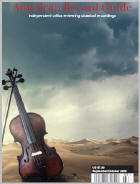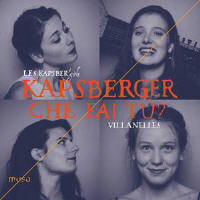Texte paru dans: / Appeared in: Muso |
||||
|
Outil de traduction ~ (Très approximatif) |
||||
|
Reviewer: Peter
Loewen What a delightful recording by a remarkable ensemble. Kapsberger is an outstanding composer, and these young women—The Kapsber'girls—sing and play this music with all of the requisite gusto and style. The bulk of the program derives from Giovanni Girolamo Kapsberger's first four books of villanellas for 1, 2, and 3 voices, published in 1610, 1619, and 1623. Albane Imbs plays all of the plucked instruments (archlute, theorbo, baroque guitar, and tiorbino) with equal expertise, both in continuo and solo in several dances and a toccata that break up the program of vocal music. Barbara Hünninger fills out the continuo playing bass violin; she is also the soloist on a 'Passe Calli' from Giovanni Battista Vitali's Op. 7. Alice Duport Percier (soprano) and Axelle Verner (mezzo-soprano) have lovely, supple voices. Villanellas are rustic peasant songs—originally strophic songs in Neapolitan dialect, based on popular melodies. By Kapsberger's time, the genre had evolved to include a range of subject matter, from comic to serious, while retaining its simple strophic form. Most of the songs performed here have Duport Percier and Verner singing together. Kapsberger's settings are universally syllabic and keep the voices in parallel thirds, though he embellishes phrase endings and cadences with suspensions that yield exquisite dissonances. Dance rhythms and shifts between duple and triple meter are commonplace. 'Che Fai Tu?', the first song on the program, sets the tone, full of enthusiasm, and shifts to triple meter, which Imbs underscores by playing chords percussively. Some songs have programmatic elements built in, which the singers emphasize. For example, in 'Alla Caccia', Kapsberger has voices imitate the echo of hunting horns. Other songs, like 'Vedete la Mia Luce', convey the character of monody from contemporary opera. 'Adir' evokes aspects of secunda prattica madrigals, particularly in the use of agitated rhythms to evoke sounds and emotions of war. The program closes with a beautiful lullaby, 'Figlio dormi', sung in a hushed manner by Verner. Text and notes are in English.
| ||||
|
||||
|
|
|
|||
|
Cliquez l'un ou l'autre
bouton pour découvrir bien d'autres critiques de CD |
||||




